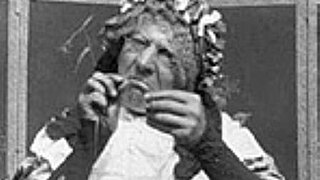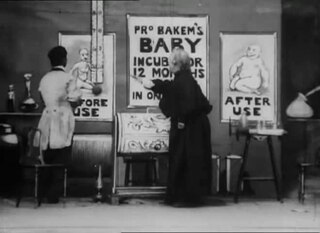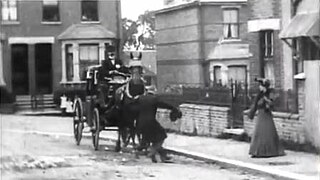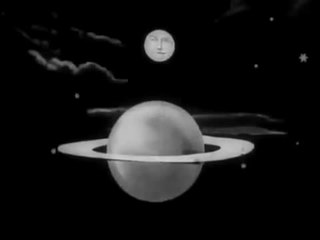Related Research Articles

The Kiss in the Tunnel, also known as A Kiss in the Tunnel, is a 1899 British short silent, comedy film, produced and directed by George Albert Smith, showing a couple sharing a brief kiss as their train passes through a tunnel, which is said to mark the beginnings of narrative editing. The film is the first to feature Laura Bayley, Smith's wife.

Grandma Threading her Needle is a 1900 British short silent comedy film, directed by George Albert Smith, featuring an old woman trying to get a thread though a needle. The sole purpose of the 56-second single-shot film, like the director's earlier Old Man Drinking a Glass of Beer (1898), according to Michael Brooke of BFI Screenonline, "is to record changing facial expressions for the purposes of entertainment."

Explosion of a Motor Car is a 1900 British silent comic trick film, directed by Cecil M. Hepworth, featuring an exploding automobile scattering the body parts of its driver and passenger. "One of the most memorable of early British trick films" according to Michael Brooke of BFI Screenonline, "was one of the first films to play with the laws of physics for comic effect." It features one of the earliest known uses in a British film of the stop trick technique discovered by French filmmaker Georges Méliès in 1896, and also includes one of the earliest film uses of comedy delay – later to be widely used as a convention in animated films – where objects take much longer to fall to the ground than they would do in reality. It is included in the BFI DVD Early Cinema: Primitives and Pioneers and a clip is featured in Paul Merton's interactive guide to early British silent comedy How They Laughed on the BFI website.

Santa Claus is an 1898 British silent trick film directed by George Albert Smith, which features Santa Claus visiting a house on Christmas Eve. The film, according to Michael Brooke of BFI Screenonline, "is believed to be the cinema's earliest known example of parallel action and, when coupled with double-exposure techniques that Smith had already demonstrated in the same year's The Mesmerist (1898) and Photographing a Ghost (1898), the result is one of the most visually and conceptually sophisticated British films made up to then." It has been described as the very first Christmas movie and a technical marvel of its time.

A Railway Collision is a 1900 British short silent drama film, directed by Walter R. Booth and produced by Robert W. Paul. It was one of a number of sensationalist "trick films" made at Paul's Animatograph Works, his studio in Muswell Hill in north London, and represents one of only a very small number of surviving films by Paul.

Walter Robert Booth was a British magician and early pioneer of British film. Collaborating with Robert W. Paul and then Charles Urban mostly on "trick" films, he pioneered techniques that led to what has been described as the first British animated film, The Hand of the Artist (1906). Booth is also notable for making the earliest film adaptation of A Christmas Carol with the silent film Scrooge, or, Marley's Ghost (1901).

Undressing Extraordinary is a 1901 British silent comic trick film directed by Walter R. Booth, featuring a tired traveller struggling to undress for bed. The short, which lasts 3 minutes 10 seconds, "provides one of the earliest filmed examples of something that would become a staple of both visual comedy and Surrealist art: that of inanimate objects refusing to obey natural physical laws, usually to the detriment of the person encountering them," and, according to Michael Brooke of BFI Screenonline, "has also been cited as a pioneering horror film," as, "the inability to complete an apparently simple task for reasons beyond one's control is one of the basic ingredients of a nightmare."

The Waif and the Wizard, also entitled The Home Made Happy, is a 1901 British silent comic trick film, directed by Walter R. Booth, featuring a magician using his magic to aid an ailing girl at the request of her brother. The film, "is rather less elaborate in terms of special effects than the other films that W.R. Booth and R.W. Paul made the same year," but, according to Michael Brooke of BFI Screenonline, "provides an excellent illustration of how effects used sparingly can often have more impact, especially when set in a suitable emotional context."

An Over-Incubated Baby is a 1901 British silent comic trick film, directed by Walter R. Booth, featuring a woman who gets an unpleasant surprise after placing her baby in Professor Bakem's baby incubator for 12 months growth in one hour. The film is, "one of the most original of the trick films made by W.R. Booth and R.W. Paul in 1901." According to Michael Brooke of BFI Screenonline, "one of the less elaborate films made by Booth and Paul that year, though the concept itself is so imaginative that it arguably didn't need any more than basic jump-cut transformations."

Cheese Mites, or Lilliputians in a London Restaurant is a 1901 British short silent trick film, directed by Walter R. Booth. A gentleman is entertained by the little people who emerge from the cheese at his table.

Artistic Creation is a 1901 British silent comic trick film directed by Walter R. Booth, featuring a lightning sketch artist drawing a picture of a woman which comes to life piece by piece. The film "is one of the earliest examples of a film about an artist's creations coming to life," and according to Michael Brooke of BFI Screenonline, "a metaphorical cautionary tale about the responsibilities that should be borne by both creative artists and indeed the male sex in general."

The Haunted Curiosity Shop is a 1901 British silent horror trick film directed by Walter R. Booth, featuring an elderly curio dealer alarmed by various apparitions that appear in his shop.

The Extraordinary Waiter is a 1902 British silent comic trick film, directed by Walter R. Booth, featuring a brutish colonialist failing to destroy a blackfaced waiter. The film "makes for somewhat uncomfortable viewing," but according to Michael Brooke of BFI Screenonline, "it's just about possible to read this as a metaphor for the rather more widespread frustrations arising from British colonial rule, though it seems unlikely that this was intentional on Booth's part."

An Extraordinary Cab Accident is a 1903 British silent comic trick film, directed by Walter R. Booth, featuring a gentleman making a miraculous recovery after being trampled underfoot by a horse and cab. The film, "seems something of a step back," "compared with the elaborate special effects fantasies that director W.R. Booth and producer R.W. Paul had already concocted," but according to Michael Brooke of BFI Screenonline, "more complex special effects might well have worked against the impression Booth and Paul were clearly seeking to create, which is that of a man being genuinely run over by a horse-drawn cab, his body being knocked down and trampled by the horse's hooves."

The '?' Motorist is a 1906 British silent comedy trick film, commonly called "The Mad Motorist" or "Questionmark Motorist" and directed by Walter R. Booth. Released in October 1906, the film is "one of the last films that W.R. Booth made for the producer-inventor R.W. Paul," and, according to Michael Brooke of BFI Screenonline, "looks forward to the more elaborate fantasies that Booth would make for Charles Urban between 1907 and 1911, as well as drawing on a wide range of the visual tricks that Booth had developed over the preceding half-decade."

Is Spiritualism a Fraud? is a 1906 British silent trick film directed by Walter R. Booth, featuring a medium exposed as a fake during a séance.
The Unfortunate Policeman is a 1905 British short silent comedy film, produced by Robert W. Paul, featuring a policeman chasing a young painter after he tips a pot of paint over him. The film is an, "elaborate chase comedy," which according to Michael Brooke of BFI Screenonline, "is an example of the increasing use of real locations in R.W. Paul's work." Film historian Ian Christie adds, "the irreverent and disrespectful treatment of the policeman would soon become impossible in British films, thanks to the notorious list of proscriptions laid down by the British Board of Film Censors shortly after its creation in 1912."

The Biter Bit is an 1899 British short black-and-white silent comedy film, produced by Bamforth & Co Ltd, featuring a boy playing a practical joke on a gardener by grasping his hose to stop the water flow and then letting go when the gardener looks down it to check. The film "is an English remake" of Auguste and Louis Lumière's L'Arroseur Arrosé (1895), according to Michael Brooke of BFI Screenonline, "providing a good illustration of how early film production companies cheerfully plagiarised each other's work" with "a few minor differences between, most notably a rather greater sense of space and depth in the Bamforth version" and "three distinct planes to the action". It is included in the BFI DVD Early Cinema: Primitives and Pioneers and a clip is used in Paul Merton's interactive guide to early British silent comedy How They Laughed on the BFI website.

The Automatic Motorist is a 1911 British silent comic trick film, directed by Walter R. Booth, featuring a robot chauffeur taking an inventor and a young honeymooning couple on a wild ride around the planets and under the sea. The trick film is a "virtual remake of The '?' Motorist (1906)," according to Michael Brooke of BFI Screenonline, "but on a bigger scale."

Willie's Magic Wand is a 1907 British silent comic trick film, directed by Walter R. Booth, featuring a young boy terrorising the household with his father's magic wand.
References
- ↑ "Upside Down; or the Human Flies - Victorian Popular Culture - Adam Matthew Digital". www.victorianpopularculture.amdigital.co.uk. Retrieved 7 November 2018.
- ↑ Brooke, Michael. "Upside Down; or, the Human Flies". BFI Screenonline Database. Retrieved 24 April 2011.